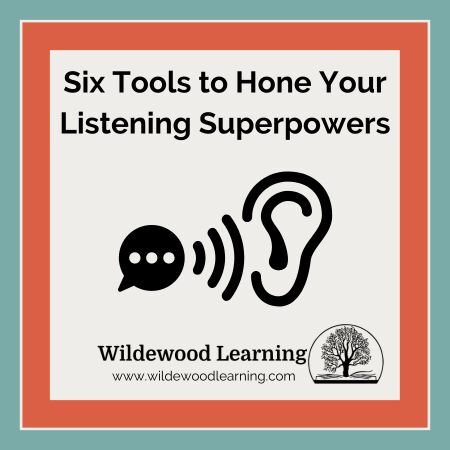Six Tools to Hone Your Superpower Listening
Did you know that listening, when done effectively, can be a superpower? It is! Just like a superhero uses their powers for good, you can harness the power of listening to transform your personal and professional relationships.
This is especially true in the modern world, where there is so much distraction. Phones are dinging with notifications, everyone is talking all at once, and our heads are down, rushing off to the next appointment. There is no time just to stop and listen. Listen to yourself, listen to others, or listen to the earth.
Over the past month, I have listened. What I have learned is that:
- Listening takes work.
- Listening can be uncomfortable.
- Listening will shift a relationship.
Through my practice of listening, I have learned a lot about myself and my family members. Things that I thought I knew, I was wrong. Feelings that I had while a family member talked were genuinely uncomfortable. I wanted to defend, tell my side of the story, and shut down. Yet I tried my best to be present, sit through the discomfort, and check in with my thoughts and feelings. This process of active listening has not only improved my relationships but also empowered me with a deeper understanding of myself and others.
What has been the outcome of my practice? The family member felt they were heard and what they had to say mattered. It has shifted our relationship to a better place, and we feel more trust in one another.
Think about something that you accomplished where you felt proud. Now, remember the process of getting to that accomplishment. Was it easy? Probably not. Was it fast? Usually not. Was it worth it? Yes!
Listening is the same: not easy, not fast, and totally worth it. It’s a journey that requires determination and commitment, but the rewards of improved relationships and personal growth make it a journey worth taking.
Tools to Practice Your Listening Superpower
- Be Present: Sit for one minute and do nothing. Come on, you have one minute to spare. Keep practicing this daily. See if you can stretch it to 2 minutes. Being present is essential to listening with your heart.
- WAIT, an acronym for ‘Why Am I Talking? ‘, is a powerful tool to enhance your listening skills. It encourages you to pause before speaking, allowing you to choose your words with care and examine your intent.
- Pause: Stop and sit in the discomfort of silence. Sit with your uncomfortable feelings and thoughts.
- Reflect: If you need to say something, reflect to the speaker what you heard them say. Start with the phrase, “What I heard you say is ….” Then say what you heard.
- Go deeper: Ask the speaker to tell you more about their perception. Let them tell you what they need to say.
- Regulate: After listening to something difficult, you might need a break to process. Go for a walk, write in a journal, listen to music, or do an activity that can help you feel calm. Once you are calm, you can ask if the person is willing to listen to your side of the story.
Each of these tools requires practice. I suggest focusing on one at a time when practicing listening. You can practice listening at any time. Maybe a co-worker is telling you about a fun vacation. You stop, listen, and practice reflecting back to them or asking them to tell you more about the experience.
Listening is just one of the Superpower tools I teach in my workshops to support you and your colleagues in building organizational resiliency. Find out more about upcoming Wildewood Learning events where you can learn more about honing your Listening Superpowers: https://wildewoodlearning.com/events/

